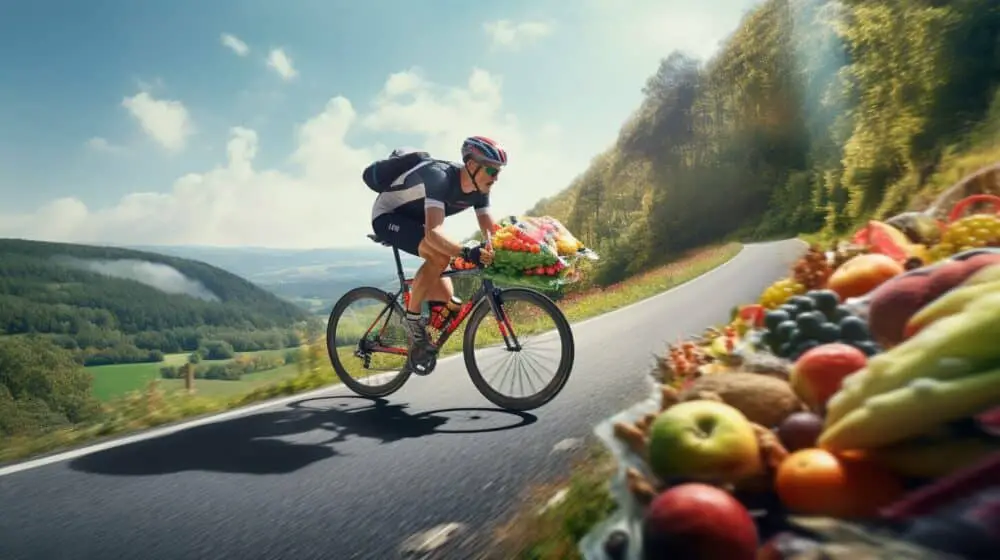As a professional cyclist, I know firsthand the importance of nutrition for optimal performance on the road. Proper fueling is key to sustaining energy levels, enhancing endurance, and aiding in recovery. Whether you’re training for a long bike ride or tackling a challenging route, choosing the right foods can make all the difference.
During a long bike ride, your body relies on glycogen stores for energy. It’s essential to consume adequate amounts of carbohydrates to maintain these stores and keep your body fueled throughout the ride. Additionally, protein-rich foods can help repair muscles and aid in post-ride recovery. Energy gels and protein bars can also provide quick fuel during the ride, but it’s important to balance their consumption with solid food to avoid excessive intake of saturated fats.
Key Takeaways:
- In road cycling, optimal nutrition is crucial for peak performance.
- Consuming adequate carbohydrates and protein-rich foods is essential for sustaining energy levels and aiding in recovery.
- Balancing the consumption of energy gels and protein bars with solid food is key to avoiding excessive intake of saturated fats.
Fueling Your Ride: The Importance of Nutrition
As a road cyclist, you know that long rides require proper fueling to maintain energy levels and maximize performance. Choosing the right cycling foods and fluids can make all the difference, whether you are planning a leisurely ride or a challenging race.
For rides lasting less than an hour, you may not need to eat during the ride, but be sure to hydrate with water or a sports drink. For longer rides, you’ll need to fuel your body properly before, during, and after the ride.
Before the ride, focus on consuming carbohydrates to build up glycogen stores in your muscles. Some good options include oatmeal, whole grain bread, or a peanut butter and banana sandwich. Additionally, avoid consuming too much fiber or fat before a ride as they can slow digestion and potentially cause discomfort during the ride.
During the ride, aim to consume about 30-60 grams of carbohydrates per hour, depending on your body weight and the intensity of the ride. This can come from energy gels, solid foods such as bananas or energy bars, or sports drinks which provide both carbohydrates and electrolytes. Make sure to also hydrate with at least one bottle of water per hour of riding to maintain proper fluid levels.
After the ride, focus on replenishing your body’s carbohydrate and protein stores with a recovery meal or drink within 30 minutes of finishing the ride. High glycemic carbs such as fruit juice or white bread can quickly replenish carbohydrate stores, while protein bars or shakes can aid in muscle repair and recovery. Recovery drinks that provide both carbohydrates and amino acids can also be beneficial in promoting recovery.
Proper nutrition is key for long rides, so make sure to plan ahead and choose the best cycling foods and fluids to fuel your body and enhance your performance.
Pre-Ride Nutrition: Building a Solid Foundation
Endurance cycling requires a steady supply of energy to fuel your ride and maintain optimal performance. To achieve this, it’s crucial to focus on carbohydrate intake before hitting the bike ride. Carbohydrates are a primary source of energy for your body, and increased endurance demands a more substantial carbohydrate intake.
When planning your pre-ride nutrition strategy, make sure to incorporate plenty of healthy, complex carbohydrates such as whole grains, fruits, and vegetables. These slow-burning carbohydrates will provide sustained energy throughout your ride.
In addition to complex carbs, incorporating healthy fats and protein into your pre-ride meal can also provide a slower-burning source of fuel. For example, spreading peanut butter on whole-grain toast is an excellent way to include healthy fats and protein in your pre-ride meal.
On-the-Ride Fueling: Sustaining Energy Levels
When it comes to road cycling, maintaining a consistent energy level is essential for peak performance. This means ensuring that you consume enough calories to keep your body fueled throughout your ride. Proper nutrition during the ride also has many health benefits, such as maintaining stable blood sugar levels and reducing muscle fatigue.
Calorie consumption during your ride should be based on your estimated energy expenditure. The general rule of thumb is to consume 30 to 60 grams of carbohydrates per hour of cycling. This will help to replenish your body’s glycogen stores and maintain energy levels.
Protein intake is also important for endurance cyclists. Consuming protein during your ride can help to prevent muscle breakdown and aid muscle repair. The recommended protein intake during the ride is about 8-10 grams per hour of cycling.
It’s important to remember that excessive consumption of energy gels or other high-carb snacks can lead to a rapid increase in blood sugar, followed by a crash. To avoid this, try incorporating solid food snacks, such as protein bars, and focus on consuming moderate amounts.
In summary, maintaining optimal nutrition during your ride is essential for sustained energy levels and overall health benefits. Focusing on calorie consumption and protein intake can help to reduce muscle fatigue and maintain stable blood sugar levels. Remember to choose your snacks wisely to avoid excessive consumption of high-carb snacks that can lead to a blood sugar crash.
Choosing the Right Cycling Snacks
As a road cyclist, it’s essential to choose the right snacks to keep you fueled and energized during your rides. Consuming a moderate-sized meal before a ride can provide the necessary carbohydrates to fuel your body, while also taking into account your body weight and specific training goals. Here are some of the best foods to include in your training diet:
- Fruits such as bananas, apples, and grapes
- Whole-grain bread or crackers
- Nuts and seeds
- Low-fat dairy products such as yogurt or cheese
- Lean protein such as boiled eggs or grilled chicken
It’s crucial to take into account your body weight when planning your nutrition strategy for road cycling. Carrying excess weight can impact your performance and endurance on long rides, so incorporating a healthy and balanced diet is key. In addition to choosing the right foods, portion control is also essential.
When choosing snacks during a long ride, opt for easily digestible foods that won’t weigh you down. Energy gels and bars, as well as solid food such as sandwiches or fruit, are great options to sustain your energy levels and keep you going. Remember to stay hydrated and maintain your body’s balance of electrolytes.
Hydration and Electrolyte Balance
When it comes to road cycling, proper hydration and electrolyte balance are critical components of any nutrition strategy. Dehydration can lead to a drop in blood pressure, which can cause dizziness, fatigue, and muscle cramps. As such, it’s important to maintain proper fluid intake throughout your ride.
The body also loses electrolytes, such as sodium and potassium, during prolonged exercise. Without adequate replacement, electrolyte imbalances can occur, leading to issues with the body’s balance and overall performance. To prevent this, it’s important to consume electrolyte-rich fluids and/or sports drinks during your ride.
But how much fluid should you be taking in? It varies for each individual, depending on factors such as body weight, temperature, and exertion level. As a general guideline, aim for around 500ml of fluid per hour of cycling. However, you may need more if you’re sweating heavily or riding in very hot weather.
It’s also important to bear in mind that overhydration can be just as detrimental as dehydration. Too much fluid can dilute the body’s sodium levels, leading to a dangerous condition known as hyponatremia. To avoid this, aim for a balance of hydration and electrolyte intake throughout your ride.
Recovery Nutrition: Helping Your Body Recover
After a long and grueling bike ride, recovery nutrition is crucial to help your body heal and recover. One of the key components of this process is replenishing your carbohydrate stores, which can become depleted during extended periods of exercise. High glycemic carbs are particularly effective for quickly restoring these stores, as they are rapidly absorbed by the body.
Recovery drinks are also a popular option for many cyclists, as they contain a mix of carbohydrates and amino acids that can aid in muscle recovery. Amino acids are the building blocks of protein, which is essential for repairing and rebuilding muscle tissue that may have been damaged during the ride.
When choosing a recovery drink, look for one that contains both simple and complex carbohydrates, as well as a blend of amino acids. Some popular options include chocolate milk, which is high in both carbs and protein, and sports drinks that are specifically designed for post-workout recovery.
It’s also important to maintain a balanced diet in the days following your ride, in order to continue fueling your body’s recovery. This may include consuming additional protein, as well as incorporating fruits and vegetables into your diet to provide essential vitamins and minerals.
By prioritizing recovery nutrition, you can help your body recover more quickly and effectively, allowing you to get back on the road sooner and perform at your best.
Balancing Fat Intake for Performance
While carbohydrates are a critical source of fuel for endurance athletes, fat intake is also crucial for peak performance. However, not all fats are created equal, and it’s important to balance your intake of saturated and unsaturated fats for optimal results.
Saturated fats, often found in processed foods and fatty meats, can hinder performance by slowing down digestion and increasing the risk of gastrointestinal issues. To counteract this, opt for protein bars as a convenient source of building blocks for muscle repair and recovery.
In addition, incorporating low-fat dairy into your diet can provide a valuable source of protein and calcium while keeping your saturated fat intake in check. This can include options like skim milk or Greek yogurt, which are high in protein and low in fat.
On the other hand, unsaturated fats like those found in nuts, seeds, and fish can provide a valuable source of energy and promote heart health. Including healthy fats in your diet can also aid in the absorption of fat-soluble vitamins, supporting overall nutrition.
In summary, balancing your fat intake is an important aspect of performance nutrition for road cycling. By prioritizing sources of unsaturated fats and incorporating low-fat dairy and protein bars as needed, you can optimize your fueling strategy and enhance your endurance and recovery.
Weight Management and Performance
When it comes to road cycling, weight management plays a crucial role in performance. Excess weight can directly impact speed, endurance, and overall energy levels on the bike. To optimize performance, it’s important to maintain a healthy body weight through proper nutrition and exercise.
One key factor to consider is carb absorption. Consuming too many processed foods high in carbohydrates can actually hinder performance by slowing down carb absorption and causing a crash in energy levels. It’s important to choose whole, nutrient-dense foods to ensure efficient carb absorption and sustained energy levels.
In addition, maintaining a healthy body weight is essential for endurance cycling. Carrying excess weight can put extra strain on the body and negatively impact endurance. Incorporating strength training and regular exercise into your routine can help build muscle and reduce body fat for enhanced performance.
Overall, prioritizing weight management through proper nutrition and regular exercise is key to improving performance on the bike. Focus on choosing nutrient-dense foods, limiting processed foods, and maintaining a healthy body weight to optimize your cycling performance.
Conclusion
In conclusion, optimal nutrition is essential for road cycling performance, endurance, and recovery. By prioritizing the right food choices and strategies, cyclists can ensure they have sufficient glycogen stores, maintain stable blood sugar levels, and avoid dehydration.
In this article, we have explored the importance of fueling your body before, during, and after a long bike ride, with a focus on the best cycling foods and fluids. We have also discussed the specific nutritional needs for rides lasting less than an hour, pre-ride nutrition strategies, and on-the-ride fueling.
Additionally, we have covered the importance of choosing the right cycling snacks, maintaining proper hydration and electrolyte balance, and recovery nutrition after a long ride. We also examined the role of fat intake for performance and weight management.
Remember to prioritize your nutrition, with a focus on consuming adequate carbohydrates, high glycemic carbs, and protein-rich foods. Incorporate appropriate snacks, recovery drinks, and electrolyte-balanced fluids into your nutrition strategy.
And finally, remember to maintain a healthy body weight, avoid processed foods, and use caution with saturated fats. By following these guidelines, you can ensure optimal nutrition for enhanced road cycling performance, endurance, and recovery.
FAQ
Q: What is the importance of nutrition for road cycling?
A: Nutrition plays a vital role in road cycling as it provides the energy and nutrients needed for optimal performance, endurance, and recovery.
Q: What are the best food choices for road cycling?
A: The best food choices for road cycling are those that provide a balance of carbohydrates, protein, and fats. This includes foods such as whole grains, lean proteins, fruits, vegetables, and healthy fats.
Q: Why are glycogen stores important for cycling?
A: Glycogen stores are important for cycling as they are the body’s primary source of energy during endurance activities. It is crucial to replenish these stores through proper nutrition to maintain energy levels.
Q: What role do protein-rich foods play in road cycling?
A: Protein-rich foods are essential for road cycling as they aid in muscle repair and recovery. They also help to support endurance and prevent muscle breakdown during long rides.
Q: Are energy gels and protein bars beneficial for cycling?
A: Yes, energy gels and protein bars can be beneficial for cycling as they provide a convenient and quick source of energy and nutrients. However, it’s important to use them in moderation and not rely solely on them for nutrition.
Q: Should I be cautious about consuming saturated fats?
A: Yes, it is important to be cautious about consuming saturated fats as they can negatively impact performance and health. It’s best to prioritize healthier fats, such as those found in nuts, seeds, and avocados, for optimal nutrition.
Q: What are the specific nutritional needs for rides lasting less than an hour?
A: For rides lasting less than an hour, it is generally not necessary to consume additional fuel. However, staying hydrated with water or a sports drink can help maintain optimal performance.




